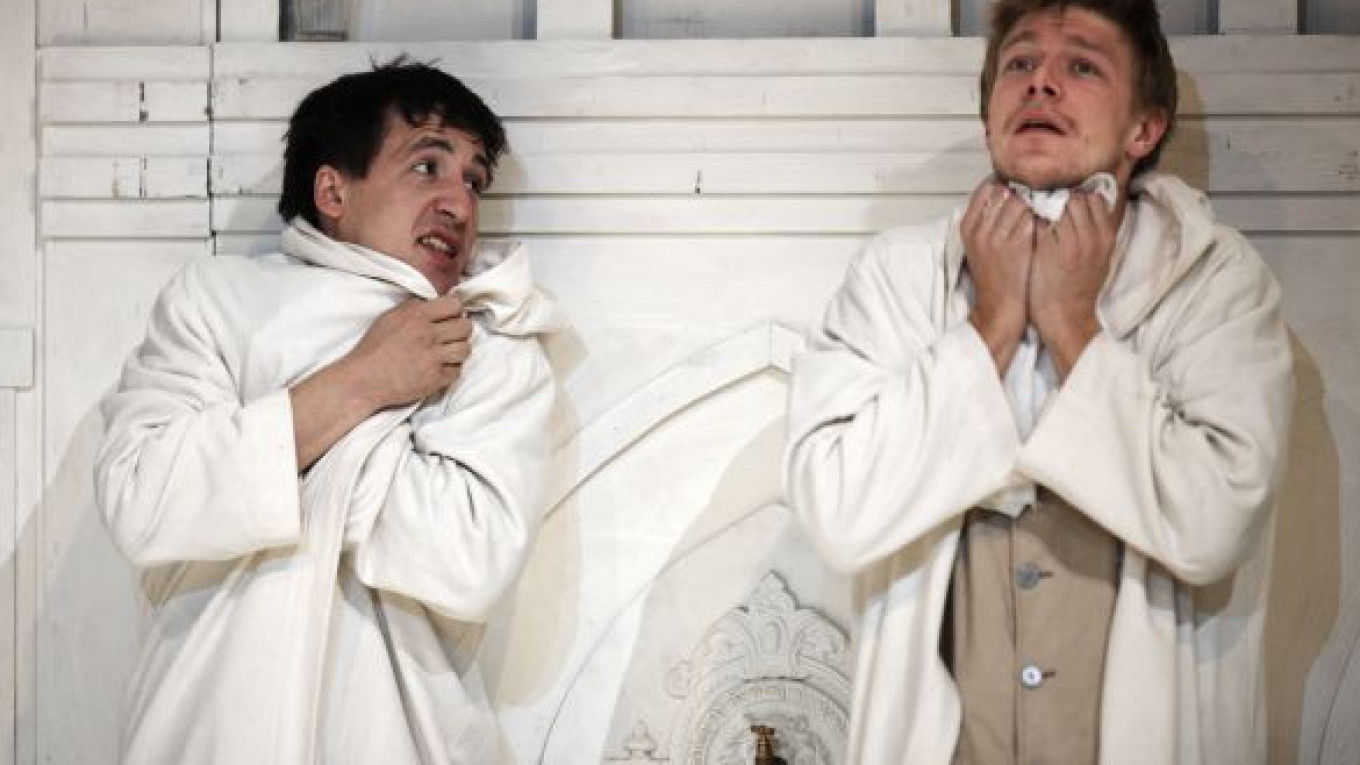Joseph Brodsky did not often cross paths seriously with the theater world. The great poet did write two plays and translated at least one I know of. None has ever had much impact.
“Gorbunov and Gorchakov,” which Yevgeny Kamenkovich mounted on the small stage at the Sovremennik Theater, is not a play. It is, rather, a poem in fourteen segments and 7,600 words that consists entirely of dialogue. Brodsky is reported to have said it was all “natural” speech that he once overheard. I’ll leave it to others more knowledgeable than I to verify or contradict that claim.
More readily acceptable is that this poem arose as a literary response to two relatively brief, but undeniably unpleasant, incidents in the poet’s life — stints in an insane asylum when some Soviet authorities set out to break the unruly young man’s spirit. During at least one of those stays in late 1963 and early 1964, Brodsky was put in a cell with patients prone to violence. The reason ostensibly was to scare him.
“Gorbunov and Gorchakov,” completed in 1968, four years before the writer would be forced into emigration, clearly was inspired by the time he spent in the asylum. The careful reader soon begins to realize that the poem’s action — what there is of it — is set in a hospital of some kind. There are pajamas, food pans, someone by the name of Babanov snoring by the window, and a man named Mickiewicz who is constantly underfoot.
What takes awhile to achieve focus on the page is immediately clear on stage thanks to the set designed by Alexandra Dashevskaya, Valentina Ostankovich and Filipp Vinogradov. Even before anything happens, the grungy white walls of what looks like an old church house close in on figures seated in a wheel chair and on old-fashioned cots. Upon closer inspection, it turns out they are catatonic — motionless, expressionless, even breathless. In fact, they are life-size puppets. A ballet, perhaps “Swan Lake,” pointlessly runs on a television set placed high on the back wall.
Everything about the space belies sterility and impresses upon us the revolting atmosphere of neglected sickness.
Beyond that, everything else is significantly less clear.
Gorbunov (Nikita Yefremov) and Gorchakov (Artur Smolyaninov) are constantly engaged in dialogue and intellectual conflict. The former is something of a dreamer, the latter a schemer. Gorbunov is set upon discovering his own personal space of independence. Gorchakov is intent on betraying Gorbunov in order to buy his freedom. He is the quintessential traitor.
So tightly are the two bound by their interactions — including interrogations suffered at the hands of a haughty doctor (Andrei Averyanov) and a frightening nurse (Yelena Plaksina) — that you even wonder if one is the figment of the others’ imagination. They talk about dreams, the Day of Wrath and, as one might expect from Brodsky, words and language.
In fact, in the long run, Kamenkovich’s “Gorbunov and Gorchakov” seems to be more about poetry than about theater or story. For all the director’s interesting work with space and character, everything theatrical seems to remain secondary to Brodsky’s energetic, enigmatic and often startling words.
Some beautiful phrases roll off the actors’ tongues, among them, “Love is the prologue to parting,” and “My reason splits like a microbe / multiplying endlessly in silence.” It is difficult, perhaps impossible, to seek and follow story or plot in a text made up of such riches.
None of that means that “Gorbunov and Gorchakov” is not well acted. On the contrary, Yefremov is highly compelling in his supremely down-to-earth, yet saint-like interpretation of the sensitive Gorbunov. Smolyaninov is impeccable in that most difficult of roles: a nasty, evil character. The measure of his success comes late when he unexpectedly reveals Gorchakov’s human side and we suddenly feel compassion for him.
Of great importance to this performance are the cellmates Mickiewicz (Averyanov in a second role) and Babanov (Rogvold Sukhoverko). The former is an eccentric who plays the piano, licks his lips constantly and sings scene descriptions as you might expect a mental patient to do. The chiefly silent Sukhoverko is all over the place, getting into things, poking around and adding a world of genuine action to this literature-heavy performance.
As a piece of theater “Gorbunov and Gorchakov” is often obscure and slow moving. But that often seems not to matter. More important is the opportunity to encounter Brodsky’s potent poetry at full force over an entire evening.
“Gorbunov and Gorchakov” plays Sun. and July 26 at 7:30 p.m. on the Drugaya Stsena at the Sovremennik Theater, located at 19 Chistoprudny Bulvar. Metro Chistiye Prudy. Tel. (495) 621-6473. . Running time: 1 hour, 45 mins.
A Message from The Moscow Times:
Dear readers,
We are facing unprecedented challenges. Russia's Prosecutor General's Office has designated The Moscow Times as an "undesirable" organization, criminalizing our work and putting our staff at risk of prosecution. This follows our earlier unjust labeling as a "foreign agent."
These actions are direct attempts to silence independent journalism in Russia. The authorities claim our work "discredits the decisions of the Russian leadership." We see things differently: we strive to provide accurate, unbiased reporting on Russia.
We, the journalists of The Moscow Times, refuse to be silenced. But to continue our work, we need your help.
Your support, no matter how small, makes a world of difference. If you can, please support us monthly starting from just $2. It's quick to set up, and every contribution makes a significant impact.
By supporting The Moscow Times, you're defending open, independent journalism in the face of repression. Thank you for standing with us.
Remind me later.


